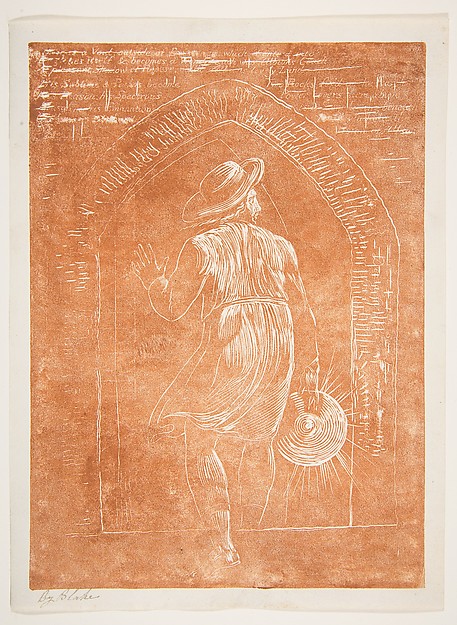Jerusalem, Plate 5, (E 147)
"Trembling I sit day and night, my friends are astonish'd at me.
Yet they forgive my wanderings, I rest not from my great task!
To open the Eternal Worlds, to open the immortal Eyes
Of Man inwards into the Worlds of Thought: into Eternity
Ever expanding in the Bosom of God. the Human Imagination
O Saviour pour upon me thy Spirit of meekness & love:
Annihilate the Selfhood in me, be thou all my life!
Guide thou my hand which trembles exceedingly upon the rock of ages,
While I write of the building of Golgonooza, & of the terrors of Entuthon:
Of Hand & Hyle & Coban, of Kwantok, Peachey, Brereton, Slayd & Hutton:
Of the terrible sons & daughters of Albion. and their Generations."
 |
| Metropolitan Museum of Art Jerusalem Frontispiece |
Much of Blake's engraving employed the relief method of printing in which the surface on which the ink would be applied was raised above the surrounding surface. He dissolved the copper which was unprotected by a resistant material to produce the elevated text and picture which would be printed. In the 'white line' engraving the surface which would be inked was protected by the resistant material which was then incised with the design. The application of acid ate only the lines leaving them lowered rather than elevated. Wax was removed, ink was lightly applied to the whole plate but did not penetrate the lines which remained white. A negative image was produced when the plate was printed.
Blake seems to have combined printing methods on individual plates in the same way that he combined water coloring and drawing with ink, charcoal or pencil along with his printing.
Annotations to Reynolds, (E 648)
"Knowledge of Ideal Beauty. is Not to be Acquired It is Born
with us Innate Ideas. are in Every Man Born with him. they are
Himself. The Man who says that we have No Innate Ideas
must be a Fool & Knave. Having No Con-Science "
Annotations to Reynolds, (E 656)
"Reynolds Thinks that Man Learns all that he Knows I say on
the Contrary That Man Brings All that he has or Can have Into the
World with him. Man is Born Like a Garden ready Planted & Sown
This World is too poor to produce one Seed"
Jerusalem, Plate 91, (E 252)
"I care not whether a Man is Good or Evil; all that I care
Is whether he is a Wise Man or a Fool. Go! put off Holiness
And put on Intellect: or my thundrous Hammer shall drive thee
To wrath which thou condemnest: till thou obey my voice
So Los terrified cries: trembling & weeping & howling! Beholding"
No comments:
Post a Comment